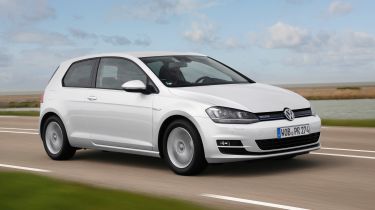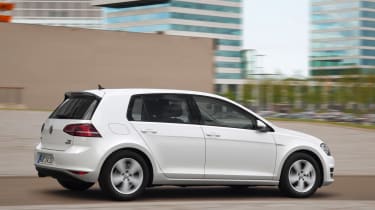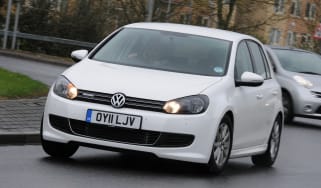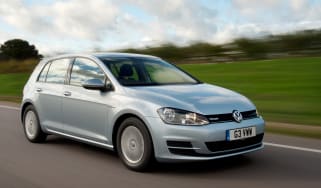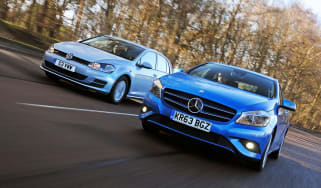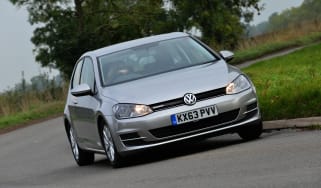Volkswagen Golf BlueMotion review
The VW Golf BlueMotion is Volkswagen's most economical family hatch yet

The Volkswagen Golf BlueMotion takes the low-emissions formula of the original Polo BlueMotion and moves it up a class. The latest model gets a choice of 1.6 TDI diesel and 1.0-litre TSI petrol engines.
For the first time, both are available with a six-speed manual box instead of the five-speed seen in the MkVI. In fact, the new TSI petrol is also available with VW’s slick seven-speed DSG dual-clutch auto, making it ideal for long-distance company car drivers.
The BlueMotion comes in three or five-door guises, and is based on the popular Match specification.
Engines, performance and drive
When Volkswagen came to develop the BlueMotion version of the MkVII Golf, it started with an all-new 1.6 TDI diesel. It’s not the same 1.6 TDI as you’ll find in the standard Golf, and is all the better for this. It’s far less rattly at idle and revs smoothly.
That feeling of smoothness continues when you set off. The 109bhp engine has a low weight to haul around thanks to the Golf’s 1,280kg kerbweight, and as a result it feels quicker than some rival cars. It was also helped by the slick-shifting six-speed gearbox. Not only does this provide accurate shifts, but it also eliminates the feeling of long-legged gearing that was a blight of the last-generation BlueMotions with their five-speed boxes.
Used - available now

2021 MINI
5-Door Hatch
28,985 milesManualPetrol1.5L
Cash £13,629
2021 MINI
5-Door Hatch
28,407 milesAutomaticPetrol1.5L
Cash £15,134
2024 Audi
A3 Sportback
39,522 milesAutomaticPetrol1.5L
Cash £20,700
2019 Suzuki
Vitara
43,756 milesAutomaticPetrol1.4L
Cash £12,249In 2015, VW added a three-cylinder 1.0-litre TSI to the BlueMotion range – boasting 113bhp and a six-speed manual gearbox. It’s incredibly smooth and amazingly quiet, yet drives like any other petrol-engined Golf. Try one, and it’ll make you think twice as to whether or not you need that fuel-sipping diesel.
At no time does either BlueMotion feel like an eco-special. They ride smoothly despite the lowered suspension, and both have lots of overtaking power should you need to pass slower moving vehicles.
That can be put down in part to the standard-fit XDS electronic differential. This limits wheelspin in tight corners, and gives the Golf a grippy front end that the Mercedes can’t come close to matching. The clever kit also makes the BlueMotion genuinely fun to hustle through a series of bends.
MPG, CO2 and Running Costs
Claimed emissions of 85g/km (for the BlueMotion TDI) are among the best of any hatchback on sale, but they don’t give the Golf any benefit over other sub-100g/km cars in terms of road tax or company car rates.
Claimed economy of 88.3mpg is pretty impressive, too, and a large fuel tank means you can go further between fills than the Mercedes A180 CDI ECO.
The petrol TSI offers a decent blend of performance versus running costs, too. It’ll return 65.7mpg, and emit a tax-busting 99g/km of CO2, meaning it too is free from annual VED. Unless you cover more than 15,000 miles, we’d suggest trying the petrol before forking out extra for a BlueMotion TDI.
Both BlueMotions eco roots are exposed when you look at the options list. Fuel-sapping kit such as sat-nav and climate control isn’t standard, although you can add larger alloy wheels, which will have a negative effect on fuel economy. Extras like cruise control, park assist, auto lights and heated seats are offered, though you’ll need to pay extra if you want them on your car. Residuals for both of these cars are a touch under 50 per cent, meaning you’ll get a decent chunk back when the time comes to sell.
Interior, design and technology
The Golf's upright styling has evolved over time, and while it’s rather plain next to the rival Mercedes A-Class, there’s no faulting the build quality. Tight shut lines are VW’s forte, and the Golf has a look of precision as a result.
The BlueMotion model is based on the popular Match specification, and as a result looks like most other Golfs on the road. To help with aerodynamics, all cars are lower to the ground, while diesel models get 15-inch alloy wheels as standard. Petrol cars upgrade to 16-inch versions, but what they lack in size they more than make up for in terms of cruising comfort.
Elsewhere, there are deeper bumpers and side sills, while the grille has a gloss black panel that smooths airflow over the nose. Extra trim on either side of the rear window does the same job. Overall, the Golf’s fuss-free and simple lines suit the no-nonsense nature of the BlueMotion, but we would recommend going for a bright silver or pale blue, because darker colours really do it no favours.
Inside, you get the same high-quality layout that you’ll find in any other Golf. It does have a bit less equipment, but build quality is solid, and subtle touches such as the flock-lined door bins add to the classy feel. The BlueMotion features VW’s touch-sensitive control screen, which works well and is intuitive to navigate around.
Practicality, comfort and boot space
Choosing the Golf BlueMotion over standard models doesn’t mean you have to compromise on practicality. The Golf BlueMotion has good boot space, while the absence of a spare wheel not only reduces weight (to help improve economy), but also allows for extra storage space under the boot floor.
The cabin is roomy, too, and another advantage is the Golf’s cabin storage. The iPod connection is in a cubby in front of the gearlever, so you can keep your device out of sight, and there’s lots of space for passenger and driver, and a wide range of seat adjustment, while large door storage, a big glovebox and deep bins behind the gearlever and by the driver’s right knee add practicality.
Reliability and Safety
The latest Golf uses VW’s MQB platform, and because this will form the basis of a raft of new models, the manufacturer has invested heavily to make sure it’s reliable and will stand the test of time.
The 1.6 TDI in the BlueMotion diesel was an all-new engine at the time of conception, using special low-friction fluids to further improve fuel economy. That said, it’s all technology that’s been proven in past BlueMotions, so this shouldn’t affect reliability.
Petrol models use the 1.0-litre engine from the Volkswagen up!, with a turbocharger added for better performance and long-distance usability. Again, this has been tried and tested, so should prove reliable.
The Golf gets seven airbags, and achieved a five-star rating in its Euro NCAP test.
